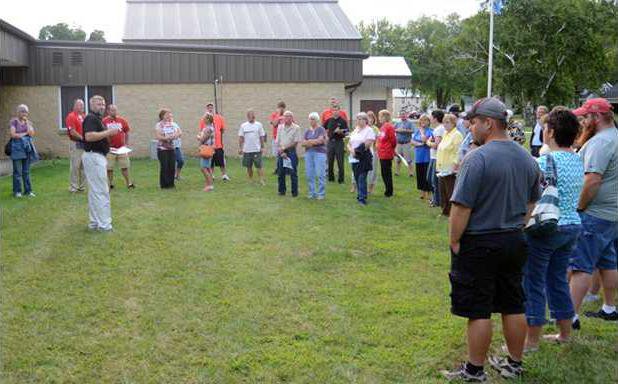“Energy savings are not going to pay for this (project),” said H&H Energy’s Josh Kaurich. “It’s icing on the cake if we can add it into the project.”
That comment came last Thursday night, Aug. 27, as Kaurich addressed a crowd of approximately 40 voters, school board members, school administrators, and maintenance staff gathered at Boscobel High School for a referendum project walk-through and public meeting by H&H Energy.
The comment came in response to inquiries on how much the energy savings would offset project costs.
H&H Energy had estimated the energy savings would save the district $900,000 over 20 years. That figure was adjusted to include inflation and rising utility costs, according to Kaurich.
In going through the project summary, Kaurich repeatedly stressed that the projects that would be funded by the referendum passing were largely facilities repairs—issues the school will need to address with or without the referendum.
While several people in the crowd expressed concern over the dilapidated state of some school structures viewed during the walk-through, one retired teacher questioned the scope of the project and the costs involved
“The district signed the contract,” said Mark Knowles. “The payment in the contract to H&H is $6.9 million.”
Knowles pointed out that H&H Energy as the designer and builder in the contract had no reason to keep costs down, as reflected by the 10 percent increase already added to the original estimates by H&H.
That increase was added, according to Kaurich, to reflect increasing costs since the work was originally bid.
Knowles spoke again, expressing discomfort with the public having no say in the scope of the project, at which point some dissent erupted in the crowd.
“That boat has sailed,” said a fellow attendee who stated that there had been many committee meetings open to the public to discuss long-range needs when the district had planned to obtain funding through Act 32.
“Who heard about them?” retorted Knowles.
Sitting in the front row, Jerry Fischer asked Kaurich why he should get behind the projects now when it would negatively impact his tax bill at a time of life when his earnings were not going to increase to cover it.
“These issues are going to have to be taken care,” Kaurich said. “And the expense of doing so will only increase the longer you wait.”
If the referendum passes, Kaurich estimated that work would be completed by the end of next summer.
“If you don’t do this, you need to come up with a facility plan,” Kaurich said. “There is an age limit to everything. And triage has a cost too.”
Interest rates
If passed, the referendum will allow the district to issue bonds for $6.9 million. Mike Clark with Robert W. Baird & Co. explained that the financial impacts were estimated conservatively. When estimated a year ago, interest was estimated at 4.50 percent. Today, if re-estimated, the interest rate would be lower at approximately at 3.5 percent, Clark said. But, depending on the districts bond rating, it could prove even lower. Without the referendum having first passed, the investment company would not have the district rated to obtain a more accurate interest rate.
Additionally, Clark explained, the tax impact was figured with an assumption of 0 percent growth in the tax base.
Other factors Clark suggested attendees consider was an increase in state aid the school would receive because of increased debt.
“Local banks can bid on the debt or work with the school on a portion of the debt,” Clark said.
He cautioned that local banks often did not carry the debt because they could not compete with the lower interest rates available in the larger market.
However, the city of Boscobel borrowed $2,176,644 from Clare Bank last December at 2.0 percent interest over 10 years as part of a refinancing package. In July 2014 the Southwest Wisconsin Technical College District Board borrowed $2.5 million from Pipe Jaffray at 1.0958 percent interest as part of a building and remodeling project.
The level of debt the school district can bear is not large enough to allow it to build new facilities, Clark pointed out.
“There is a revenue limit in place for school districts, so if the referendum does not pass, you will have to choose between capital repairs, and say, instructional spending,” Clark said.
During the walk-through, which was done before the meeting, Kaurich took attendees through the school to view troubled areas at the high school.
“The issues at the other school are pretty well represented here,” Kaurich explained.
He and several other H&H representatives and contractors showed attendees drainage problems related to broken pipes leading to the storm sewers and grading issues with the drainage. They then pointed out and discussed deteriorating roofs at the bus stop and on a portion of the building, along with aging and inefficient windows that needed upgrading. They finished the tour be taking participants in the walk through to discuss lighting and HVAC changes.
Among other concerns expressed by the crowd was the dilapidated state of the bathrooms in the high school, an item not included in the project, and a lack of representation in the crowd by families with school age children.





